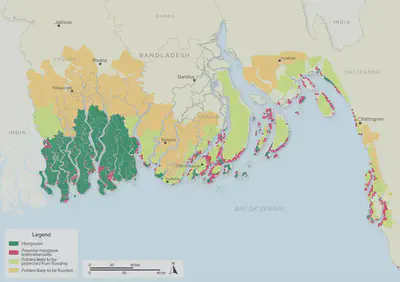OPSIS at COP28

Our research featured in some important sessions at the COP28 Climate Conference in Dubai as part of our engagement with current international discussions to help accelerate action to meet the resilient infrastructure needs of the more climate-vulnerable and/or poorest countries.
–
Transport and adaption panel
Our thanks to the UK Department for Transport for hosting an inspiring panel on transport and adaptation. Our research was shared by Holger Dalkmann.
Opening remarks were made by UK Secretary of State for Transport, Rt Hon Mark Harper and the panel included Jo Shanmugalingam, Second Permanent Secretary, Department for Transport (DfT), United Kingdom (Chair), Arun Thangaraj, Deputy Minister, Transport Canada - Transports Canada, Anna Reynolds, Lord Mayor Councillor of Hobart, Australia, our colleague Holger Dalkmann, Transport Team Lead, CCG and Nitin Jain, Director of Programs, Global Center on Adaptation.

Key takeaways from the session were:
- Transport adaptation needs more attention - from local to global, in terms of research, data, capacity building, a stronger policy framework and more finance. These can all help to reduce future risks to aging infrastructure and the services that are helping people and business (and therefore the economy).
- There is a need for better data, capacity building and finance to make the transport system more resilient.
Private Finance for Adaptation and Resilience: How to unlock investment?
A panel session was chaired by Dr Nicola Ranger, Executive Director, Oxford Martin Programme on Systemic Resilience (University of Oxford) and panellists included: Marco Serena, Chief Sustainable Impact Officer, Private Infrastructure Development Group, Martin Ewald, Managing Director, Allianz Global Investors and Amal-Lee Amin, Managing Director; Climate, British Investment International.
This panel discussed where and how we can mobilise private investment, how donor finance can be used to catalyse this, and how we can push private investors to do more. The panellists explored blended finance vehicles for adaptation and resilience; the role of Development Finance Institutions in unlocking private investment; and how to develop better country platforms and frameworks for investment in adaptation, highlighting work led by Jamaica in partnership with OPSIS and UK International Development.
Dr Ranger also released related findings from her research from the project led by OPSIS “Global Tools to Unlock Capital for Investments in Nature-Based Solutions” in partnership with the Global Center on Adaptation. The research reviews the status of nature finance globally to learn from the role played by nature-focussed funds and their investment managers, understand what works, and draw conclusions for how we might mobilise more financing for nature-based solutions for adaptation. This knowledge will inform a roadmap and toolkit for identifying viable investment modalities in Bangladesh. The focus is on exploring opportunities to overcome the barriers that hold back finance and action for NbS at scale.
Read the report here. See also an interactive case study.
Mangrove restoration potential to enhance climate resilience
At COP28, Dr Nicola Ranger also showcased another NbS study led by OPSIS, that focuses on mangrove forest potential to enhance climate resilience in the coastal zone of Bangladesh.
Mangroves in Bangladesh play a crucial role in coastal ecosystem health, providing biodiversity, erosion protection and livelihoods. The ecosystem plays a crucial role in offering a range of functions, such as shielding from storm surges and coastal erosion. Additionally, it is globally recognized as a priority for conserving biodiversity. However, mangroves face extensive degradation due to anthropogenic activities and natural hazards. The Bangladeshi coastline experiences high vulnerability to flooding and erosion due to factors like low elevation, storm surges and sea level rise. Existing infrastructure, such as polders, roads and healthcare facilities, is at risk.
The Global Centre on Adaptation is supporting OPSIS, the Resilience & Development Programme and the Nature-based Solutions Initiative to develop global tools for addressing key data gaps and unlocking capital for investment in NbS. These tools aim to determine the scale at which NbS can protect infrastructure from climate change impacts, quantify the value of existing nature-based assets and use this information to identify and evaluate NbS investment options.
The project draws on the information about the location, size and condition of the mangrove forest, as well as current and future threats facing the mangroves. The results suggest a significant decrease in the amount of mangrove vegetation in the Sundarbans area during the last twenty years.

Spatial analysis methods are used to identify hotspots with high risk. Assessment of potential mangrove restoration areas indicate that the Chittagong, Hatiya and Bhola islands, as well as some areas of Barisal, exhibit notable susceptibility to coastal hazards. By undertaking mangrove restoration efforts in Hativa, Bhola, and some areas of Chittagong, it is possible to save around 3,200 km² of agricultural land as well as critical infrastructure like health centres, schools and transportation networks, together with enhanced ecological health and biodiversity. Evaluation of previous instances of flooding in 2020 verifies that regions with established mangroves and polders saw less harm.
As the project scales up to global, the team are planning to add open-data layers and analysis results to the OPSIS/GRI Risk Viewer tool.